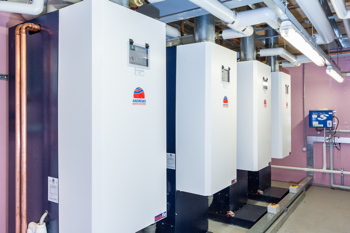The legislation timeline for water heaters

Over the next two years, legislative changes will drive manufacturers to design even more energy-efficient water heaters. Here, Jonathan Tedstone of Andrews Water Heaters looks at what’s in store.
While some say that the volume of rules, regulations and ‘red tape’ created by the EU Commission has been somewhat excessive in the past, there’s no getting away from the fact that the European Union has been particularly proactive in tackling climate change and reducing emissions, which can only be a good thing.
Currently, several EU directives and rules relating to building services apply to the UK. Though no one can say what the Brexit negotiations will mean for the UK and EU-driven legislation at this point, it’s highly probable that the Ecodesign Directive (commonly referred to as ErP) will still apply to water heaters and hot water storage cylinders.
The Ecodesign Directive (which replaced the Energy Using Products Directive in 2009) is a framework for setting eco-design specifications for energy-related products. These are products that use energy, or have an indirect impact on energy consumption. In 2013 Ecodesign Regulations were introduced to detail the minimum energy-efficiency requirements for boilers, space heaters and water heaters — including those with a storage and instantaneous design, gas, LPG, oil and electric heaters, dual-fuel heaters, solar-thermal hot-water products and dedicated heat-pump water heaters.
The minimum requirements for each product were divided into three tiers, which would be introduced over a three-year period.
Tier 1 came into force in September 2015 when the Ecodesign Directive was introduced to address the energy efficiency of water heaters, sound-power-level requirements, storage volume and information requirements. Any manufacturers not meeting these regulatory requirements for their products are not legally allowed to place them on the market in the UK and other EU countries.
Supporting the Ecodesign Directive, is the Energy Labelling Directive. This requires that water-heating products with capacities up to and including 70 kW are labelled to show their energy efficiency in a way that makes it easy to directly compare their efficiency with other models.
Water heaters and hot-water storage tanks are subject to energy labelling in the same way as domestic appliances such as fridges, freezers, TVs and washing machines. All products are given an energy label based on the outcome of a series of standard laboratory test procedures.
A product datasheet, referred to as a fiche, must also be included in the product brochure, or other literature provided with the product, and made available on manufacturer websites. Product advertisements and technical promotional material must also reference the energy-efficiency class.
Energy Labelling is there to help customers make informed purchasing decisions and help ensure a level playing field for manufacturers, while also encouraging competition between them on the environmental performance of their products.
Energy labelling was first introduced with a scale of A to G for water heaters. In 2017, the Energy Labelling Directive will be updated to introduce an A+ energy efficiency class and the G rating will be removed. The colour scale will remain the same, with dark green representing the highest energy-efficiency class and red the lowest. For contractors, this change means it will be more straightforward than ever to specify the most energy-efficient products for a job.

The Ecodesign Directive will be changing in 2018 to include mandatory limits on NOx emissions for gas, LPG and oil fired water heaters. For gas/LPG fired products the maximum NOx emissions will be 56 mg/kWh and for oil-fired products 120 mg/kWh. We expect this new requirement will generate significant changes to the water-heating sector, with new or improved models entering the market as a result.
The timetable for future legislative change is as follows.
• 26 September 2017: Tier 2 requirements regarding energy efficiency come into force. The energy labelling scale for water heaters is updated to A+ to F.
• 28 September 2018: Requirements regarding emissions of NOx come into force. Tier 3 requirements regarding the energy efficiency of water heaters start to apply. A review of the regulations is to be presented.
The great thing about the Ecodesign and Energy Labelling Directives is that manufacturers now have a clear obligation to inform buyers about the efficiency of their products, which all helps contractors and specifiers to better explain product and system efficiencies to an end user and to put together quotes based on efficiency. The new regulations are also pushing manufacturers to deliver more efficient water-heating solutions.
Progressive manufacturers have completed an enormous amount of work to identify ways to make products more efficient.
As well as investing heavily in research and development, we have also focused on compliance and test our products to the latest standards to ensure we meet current requirements. Investment in quality testing equipment means we can get the most accurate results for every product.
To make it easier for specifiers and contractors to find energy-efficiency information, we have updated our website and installation instructions for relevant products, including performance and efficiency parameters.
Jonathan Tedstone is category manager at Andrews Water Heaters.







